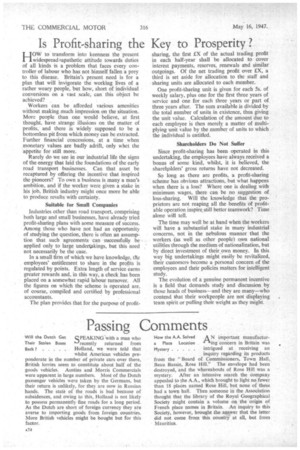Is Profit-sharing the Key to Prosperity'?
Page 26

If you've noticed an error in this article please click here to report it so we can fix it.
HOW to transform into keenness the present widespread *apathetic attitude towards duties of all kinds is a problem that faces every controller of labour who has not himself fallen a prey to this disease. Britain's present need is for a plan that will invigorate the working lives of a rather weary people, but how, short of individual conversions on a vast scale, can this object be achieved?
Workers can be afforded various amenities without making much impression on the situation. More people than one would believe, at first thought, have strange illusions on the matter of profits, and there is widely supposed to be a bottomless pit from which money can be extracted. Further financial concessions, at a time when monetary values are badly adrift, only whet the appetite for still more.
Rarely do we see in our industrial life the signs of the energy that laid the foundations of the early road transport businesses. Can that asset be recaptured by offering the incentive that inspired the pioneers? To own a business is many a man's ambition, and if the worker were given a stake in his job. British industry might once more be able to produce results with certainty.
Suitable for Small Companies Industries other than road transport, comprising both large and small businesses, have already tried profit-sharing plans with some measure of success. Among those who have not had an opportunity of studying the question, there is often an assumption that such agreements can successfully be applied only to large undertakings, but this need not necessarily be the case.
In a small firm of which we have knowledge, tl1e employees' entitlement to share in the profits is regulated by points. Extra length of service earns greater rewards and, in this way, a cheek has been placed on a somewhat rapid labour turnover. All the figures on which the scheme is operated are. of course, compiled and certified by professional accountants.
The plan provides that for the purpose of profit sharing, the first £X of the actual trading profit in each half-year shall be allocated to cover interest payments, reserves, renewals and similar outgoings. Of the net trading profit over EX, a third is set aside for allocation to the staff and sharing units are allocated to each member.
One profit-sharing unit is given for each 5s. of weekly salary, plus one for the first three years of service and one for each three years or part of three years after. The sum available is divided by the total number of units in existence, thus giving the unit value. Calculation of the amount due to each employee is then merely a matter of multiplying unit value by the number of units to which the individual is entitled.
Shareholders Do Not Suffer Since profit-sharing has been operated in this undertaking, the employees have always received a bonus of some kind, whilst, it is believed, the shareholders' gross returns have not decreased.
So long as there are profits, a profit-sharing scheme has obvious attractions, but what happens when there is a loss? Where one is dealing with minimum wages, there can be no suggestion of loss-sharing. Will the knowledge that the proprietors are not reaping all the benefits of profitable operation inspire still better teamwork? Time alone will tell.
The time may well be at hand when the workers will have a substantial stake in many industrial concerns, not in the nebulous manner that the workers (as well as other people) own national utilities through the medium of nationalization, but by direct investment of their own money. In this way big undertakings might easily be revitalized, their customersbecome a personal concern of the employees and their policies matters for intelligent study.
The evolution of a genuine permanent incentive is a field that demands study and discussion by those heads of business—and they are many—who contend that their workpeople are not displaying team spirit or pulling their weight as they might.












































































